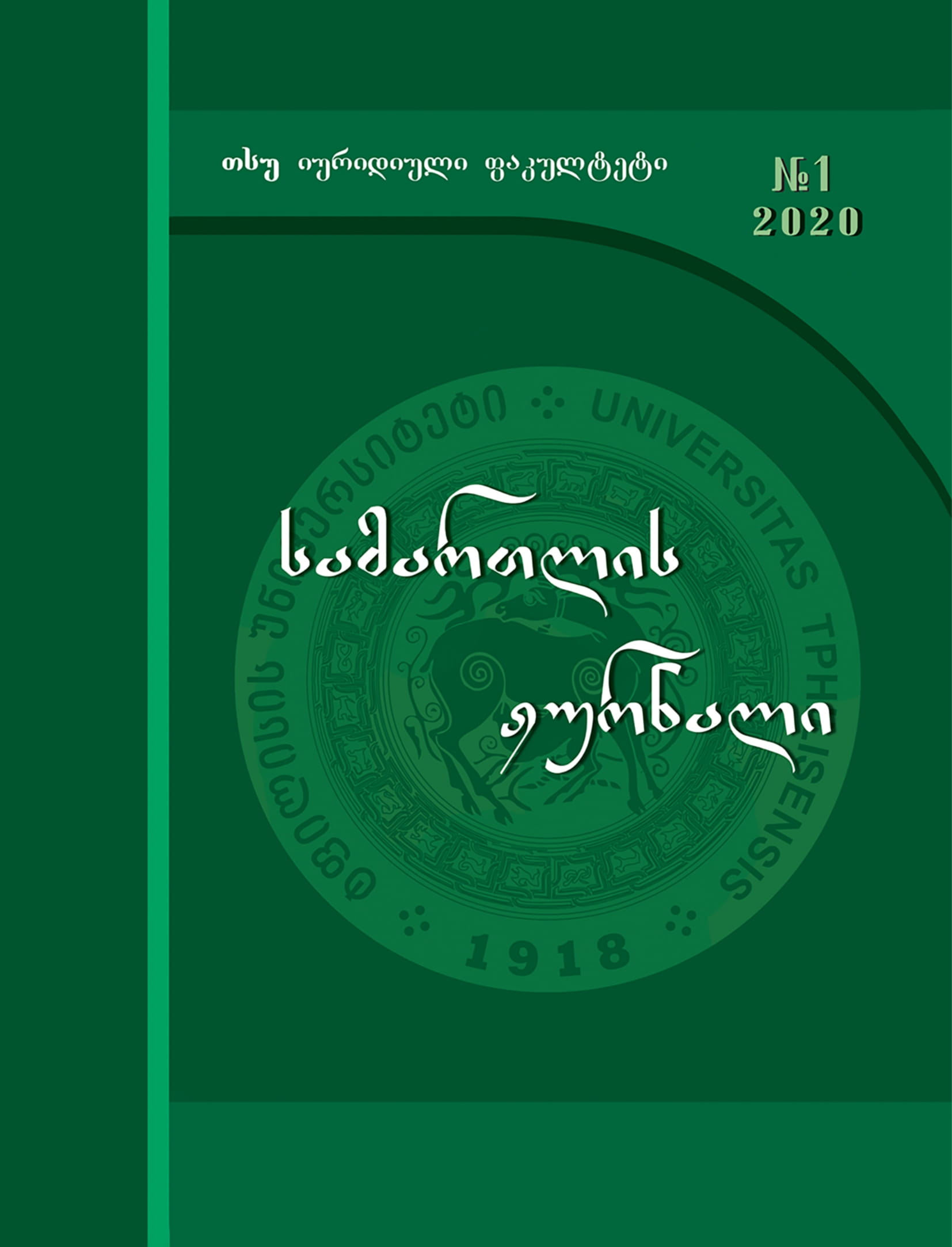კორპორაციის არსი და კორპორაციული პიროვნულობა ონტოლოგიურ ჭრილში
საკვანძო სიტყვები:
კორპორაცია; იურიდიული პირი; სამართლებრივი ფიქცია; კორპორაციის ბუნება; პირის ონტოლოგია; განცალკევებული კორპორაციული პიროვნულობა; პირის ცნება; ანთროპომორფიზაციაანოტაცია
დღევანდელ მსოფლიოში კორპორაცია მნიშვნელოვან ეკონომიკურ, სოციალურ და სამართლებრივ როლს თამაშობს. ორგანიზაციულადაც და არსობრივადაც კორპორაცია სულ უფრო კომპლექსურ ფენომენს წარმოადგენს, რომელშიც თავს იყრის მრავალი საინტერესო და მეტადრე პრობლემური საკითხი, რომელთაგან ერთ-ერთი უმნიშვნელოვანესი კორპორაციის არსი და მისი ბუნებაა. როგორც მონაწილე სამართლებრივ ურთიერთობებში, ის ფიზიკურ პირთან გათანაბრებულია, როგორც „იურიდიული პირი“, რომელსაც საკუთარი განცალკევებული პიროვნულობა ახასიათებს. ამის მიუხედავად იურიდიული პირი თავისთავად უდავოდ სამართლებრივი ფიქციაა, რომელსაც საკუთარი ბუნებრივი თვითმყოფადობა და რეალური ყოფიერება არ გააჩნია, მოკლებულია რა შესაძლებლობას გააცნობიეროს საკუთარი ქმედებანი და მისი წევრი ფიზიკური ინდივიდების გარეშე მიიღოს დამოუკიდებელი გადაწყვეტილება.
როგორც სოციოლოგიურად და ფილოსოფიურად ფიქტიური მოვლენა, რომელიც სათავეს იღებს ადამიანის მიერ ადამიანისვე თვისებების ფენომენებისადმი მიწერიდან (იგივე ანთროპომორფიზაციიდან), კორპორაციისა და მისი კორპორაციული პიროვნულობის დეტალური ანალიზი და მისი მასშივე შემავალ ფიზიკურ პირებთან ურთიერთმიმართების განხილვა აუცილებელია იმის დასადგენად, თუ კონკრეტულად რას წარმოადგენს იგი ონტოლოგიურად და არა მარტო ის, თუ რა სპეციფიკურ აღწერილობით ნიშნებს ატარებს იგი სამართლის თვალში.
წყაროები
Andenas M.,Wooldridge F., European Comparative Company Law, Cambridge University Press, Cambridge, 2009, 77.
Ando C., Law, Language, and Empire in the Roman Tradition, Philadelphia, University of Pennsylvania Press, 2011, 115-131.
Angell J.K., Ames S., Treatise on the Law of Private Corporations Aggregate, 8th Ed., Little, Brown, and Company, Boston, 1866, 764.
Ayer A.J., The Concept of Person and Other Essays, Macmillan Education, London, 1963, 82.
Bainbridge S.M., Abolishing Veil Piercing, Journal of Corporation Law, Volume 26, No. 3, Spring 2001, 488-489.
Berger R., "Disregarding the Corporate Entity" for Stockholders' Benefit, Columbia Law Review, Volume 55, No. 6, June, 1955, 814.
Blackstone W., Commentaries on the Laws of England, Book III: Of Private Wrongs,, Ed. Prest W., Oxford University Press, Oxford, 2016, 28.
Blumberg P.I., The Corporate Personality in American Law: A Summary Review, The American Journal of Comparative Law, Volume 38, Supplement. U. S. Law in an Era of Democratization, 1990, 51-52.
Blumberg P.I., The Multinational Challenge to Corporation Law: The Search for a New Corporate Personality, Oxford University Press, Oxford, 1993, 153.
Boethius., The Theological Tractates, The Consolation of Philosophy, The Loeb Classical Library, Tran. Stewart H.F., Rand E.K., Harvard University Press, Cambridge, 1968, 85.
Bottomley S., The Constitutional Corporation: Rethinking Corporate Governance, Ashgate Publishing, Aldershot, 2007, 1-3.
Bourne N., Bourne on Company Law, 6th Ed., Routledge, London, 2013, 19.
Burr V., The Person in Social Psychology, Psychology Press, Hove, 2002, 7.
Chanturia L., General Part of Civil Law, Samartali Publishing, Tbilisi, 2011, 224-228 (in Georgian).
Dan-Cohen M., Rights, Persons and Organizations: A Legal Theory for Bureaucratic Society, University of California Press, Berkeley, 1986, 15-16, 49.
Davies P.L., Gower and Davies’ Principles of Modern Company Law, 8th Edition, Sweet and Maxwell Ltd., London, 2008, 202.
Descartes R., Principles of Philosophy, Tran. Miller V.R., Miller R.P., Kluwer Academic Publishers, Dordrecht, 1982, 23-25.
Demos R., Legal Fictions, International Journal of Ethics, Volume 34, No. 1, October, 1923, 44.
Dennett D.C., Brainstorms: Philosophical Essays on Mind and Psychology, The MIT Press, Cambridge, Massachusetts, 1981, 3.
Frankfurt H.G., Freedom of the Will and the Concept of a Person, The Journal of Philosophy, Volume. 68, No. 1, January 14, 1971, 7.
French D., Mayson S., Ryan C., Mayson, French & Ryan on Company Law, 33rd Ed., Oxford, Oxford University Press, 2016, 5, 154.
French P.A., The Corporation as a Moral Person, American Philosophical Quarterly, Volume 16, No. 3, July, 1979, 208.
Gallagher S., The Natural Philosophy of Agency, Philosophy Compass, Volume 2, Issue 2, 2007, 348.
Gierke O., Political Theories of the Middle Age, Tran. Maitland F.W., Cambridge, Cambridge University Press, 1900, xx-xxi.
Goedecke W.R., Corporations and the Philosophy of Law, The Journal of Value Inquiry, Volume 10, Issue 2, June 1976, 81-82.
Gray G.C., The Nature and the Sources of Law, 2 Ed., The Macmillan Company, New York, 1921, 27.
Ireland P., Capitalism without the Capitalist: The Joint Stock Company Share and the Emergence of the Modern Doctrine of Separate Corporate Personality, The Journal of Legal History, Volume 17, Issue 1, 1996, 45-46.
Iwai K., Persons, Things and Corporations: The Corporate Personality Controversy and Comparative Corporate Governance, The American Journal of Comparative Law, Volume 47, No. 4, Autumn, 1999, 583-584.
Hamilton S.N., Impersonations: Troubling the Person in Law and Culture, University of Toronto Press, Toronto, 2009, 33.
Held V., Shame, Responsibility and the Corporation, Ed. Cutler H., Haven, New York, 1986, 170.
Hoffmann D.N., Personhood and Rights, Polity, Volume 19, No. 1, Autumn, 1986, 74-76.
Kim S.M., Characteristics of Soulless Persons: The Applicability of the Character Evidence Rule to Corporations, University of Illinois Law Review, Volume 2000, Issue 3, 2000, 790-791.
Kraakman R., Armour J., Davies P., Enriques L., Hansmann H., Hertig G., Hopt K., Kanda H., Pargendler M., Ringe W., Rock E., The Anatomy of Corporate Law: A Comparative and Functional Approach, 3rd Edition, Oxford University Press, Oxford, 2017, 1, 8.
Legal Orderings and Economic Institutions, Ed. Cafaggi F., Nicita A., Pagano U., Routledge, London, 2007, 243.
List C., Pettit P., Group Agency: The Possibility, Design, and Status of Corporate Agents, Oxford University Press, Oxford, 2011, 171, 176-185.
Locke J., An Essay Concerning Human Understanding, Volume I, Clarendon Press, Oxford, 1894, 448-449.
Machen A. W., Corporate Personality, Harvard Law Review, Volume 24, No. 4, February 1911, 257.
Maitland F.W., Moral Personality and Legal Personality, Journal of the Society of Comparative Legislation, Volume 6, No. 2, 1905, 193.
Miller S.T., The Reasons for Some Legal Fictions, Michigan Law Review, Volume 8, No. 8, June, 1910, 624-625.
Mischel W., Schoda Y., A Cognitive-Affective System Theory of Personality: Reconceptualizing Situations, Dispositions, Dynamics, and Invariance in Personality Structure, Psychological Review, Volume 102, No. 2, April 1995, 246.
Note – What We Talk about When We Talk about Persons: The Language of a Legal Fiction, Harvard Law Review, Volume 114, No. 6, April 2001, 1745-1747.
Parkinson J.E., Corporate Power and Responsibility: Issues in the Theory of Company Law, Clarendon Press, Oxford, 1993, 10, 23.
Radin M., The Endless Problem of Corporate Personality, Columbia Law Review, Volume 32, No. 4, April 1932, 647, 652-653, 654.
Revealing the Corporation: Perspectives on Identity, Image, Reputation, Corporate Branding, and Corporate-level Marketing, Ed. Balmer J.M.T., Greyser S.A., Routledge, London, 2003, 203.
Ripken S.K., Corporations Are People Too: A Multi-dimensional Approach to the Corporate Personhood Puzzle, Fordham Journal of Corporate & Financial Law, Vol. 15, No. 1, 2009, 100, 101.
Robertson D.H., Control of Industry, Nisbet and Co., Ltd., London, 1923, 85.
Rovane C., The Bounds of Agency: An Essay in Revisionary Metaphysics, Princeton University Press, Princeton, New Jersey, 1998, 5, 71-72, 137, 138-141.
Scruton R., A Short History of Modern Philosophy, 2nd Ed., Routledge, London, 2002, 51.
Scruton R., Finnis J., Corporate Persons, Proceedings of the Aristotelian Society, Supplementary Volumes, Volume 63, 1989, 253-254.
Strawson P.F., Individuals: An Essay in Descriptive Metaphysics, Routledge, London, 1990, 101-102.
Talbot L., Critical Company Law, Routledge-Cavendish, New York, 2007, 29, 38.
Teichmann J., The Definition of Person, Philosophy, Volume 60, No. 232, April, 1985, 177, 179, 180.
The Oxford Handbook of Practical Ethics, Ed. Lafolette H., Oxford University Press, Oxford, 2005, 521.
Tuomela R., Social Ontology: Collective Intentionality and Group Agents, Oxford University Press, Oxford, 2013, 5-6, 236.
Williams B., Descartes: The Project of Pure Inquiry, Routledge, London, 2005, 108.
Wormser I.M., Piercing the Veil of Corporate Entity, Columbia Law Review, Volume 12, No. 6, June 1912, 496.
Gas Lighting Improvement Co Ltd v Inland Revenue Commissioners, (1923) AC 723 at 740 – 741.
HL Bolton (Engineering) Ltd v TJ Graham & Sons Ltd, [1957] 1 QB 159, 172.
Lee v Lee’s Air Farming Ltd., [1960] UKPC 33.
Grigoleit H., Gesellschafterhaftung für interne Einflussnahme im Recht der GmbH: Dezentrale Gewinnverfolgung als Leitprinzip des dynamischen Gläubigerschutzes, C.H.Beck, München, 2006, 6-7.
Kelsen H., Reine Rechtslehre, 2.Auflage, Österreichische Staatsdruckerei, Wien, 1992, 182.
Wolf/Neuner., Allgemeiner Teil des Bürgerlichen Rechts, 11. Auflage, C.H.Beck, München, 2016, §16, Rn.23-28, 167, 169-170.
ჩამოტვირთვები
გამოქვეყნებული
როგორ უნდა ციტირება
გამოცემა
სექცია
ლიცენზია

ეს ნამუშევარი ლიცენზირებულია Creative Commons Attribution-ShareAlike 4.0 საერთაშორისო ლიცენზიით .









